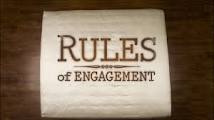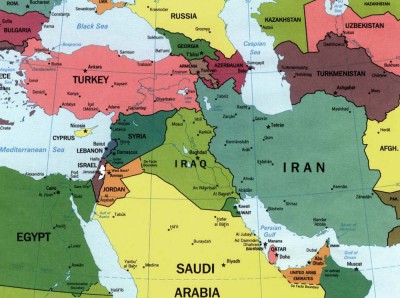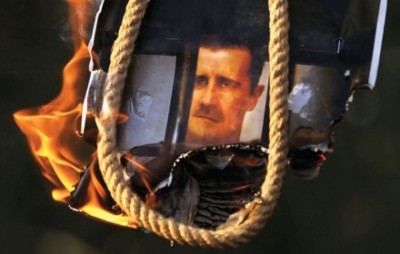Hitler’s Dunkirk Blunder.
Lately it’s been all too common for me to come across people who can tie their own shoe laces and yet they tie up the political loose ends they have come across via the MSM and life in general into conspiracy theories such as 9/11 was an inside job; or the moon landings were faked. I kid you not… the other day I had a person tell me they did not believe that an airliner slammed into the Pentagon on 9/11!
When we throw in the range of clear mental illnesses, and milder obsessions that affect large numbers of people, and then supercharge our access to people generally via the internet and then discuss war, well… all I can say is you will soon be shaking your head at the range of odd beliefs that people can and do generate.
So, to get us thinking more rationally about “grand strategy” issues 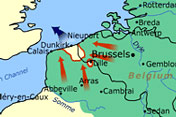 for our time I think it’s useful to look at actual historical events and the differing explanations for why things turned out as they did in the past. As World War 2 is for most people the ‘unavoidable fight’ or ‘the good war’ and is rich with events which are worth reviewing and drawing lessons from, I’ll go there and my example is the Dunkirk evacuation (Operation Dynamo). (click here to see this BBC animation of the fall of France and after reading this article you can play spot the quite blatant errors).
for our time I think it’s useful to look at actual historical events and the differing explanations for why things turned out as they did in the past. As World War 2 is for most people the ‘unavoidable fight’ or ‘the good war’ and is rich with events which are worth reviewing and drawing lessons from, I’ll go there and my example is the Dunkirk evacuation (Operation Dynamo). (click here to see this BBC animation of the fall of France and after reading this article you can play spot the quite blatant errors).
In raising this topic I don’t want to debate about the revolutionary value of working people uniting with the imperialists of Britain, France and the U.S. in WW2. I take that as a settled issue that firmly establishes that united front type politics may be a possible good policy position for western leftists to consider in this ‘the era of Imperialism’ in any specific war. But I digress…
Dynamo was a fantastically successful operation cobbled together by the British Navy in an era when darkness provided great protection for those under air attack. The British air-force had not yet won the Battle of Britain but its splendid efforts in protecting the retreat pointed (on reflection anyway) to that future success. The protection of the air force and the channel dominance and world’s best practice capabilities of the Navy were however all matched by the continuous highly effective and professional and just as often heroic efforts of the fighting ‘gunners’ (both British and French) that go quite unsung as heroes by the general populace. In conducting their systematic fighting retreat through the series of descending pockets as they were conceded from one defensive position to the next they were a formidable force. Even when the retreat was shambolic in the eyes of the infantry or themselves or anyone not involved in firing the guns directly at the enemy those guns were well fed and coordinated and they never ran out of ammunition nor targets.
What unfolded from 10May – 4June was a huge defeat but never a complete rout and the 25 days that unfolded surprised more than just the Allies. The German High Command who had never been in favour of the Manstein plan were perhaps the most surprised of all.
Dynamo was just a small part of the big picture, the long term significance of which was clearly missed when the short term ‘golden’ prize was what had escaped the Germans in WW1 and that was victory over France. The great victory for all these WW1 soldiers -who were now in command- was that the battle of the Marne was not repeated and the trenches were not dug a second time. When looking back from the 21st C one must recall that the commanders then were only too well aware that over two million men fought in the first Battle of the Marne and perhaps 500,000 were killed or wounded.
http://en.wikipedia.org/wiki/First_Battle_of_the_Marne ‘French casualties totaled 250,000, 80,000 of them dead. Of note, the French poet Charles Péguy was killed while leading his platoon’s attack at the beginning of the battle. British casualties were 13,000, 1,700 of them dead. The Germans suffered 220,000 casualties. No future battle on the Western Front would average so many casualties per day.[11]’
The raw numbers for the retreat were – Dynamo http://en.wikipedia.org/wiki/Operation_Dynamo 338,226 men (110,000 French and a ‘few’ thousand from Belgium ) cross the English channel over 9 days with only about 8,000 pulled out on the first day and 4,000 on the last! The weather ‘gods’ favoured them and so luck also played its part. (27th May)8,000; (28)18,000; (29) 47,000; (30)60,000; (31)61,000; (1June)64,000 (2-last few thousand of the British)40,000; (3)40,000; (4June)4,000: till 3.40 am when Shikari was the last ship with French troops to leave.
At dawn German troops overcame the last of the fighting rear guard and reached the beach. The very next day the Panzers that had already been reorganised and redeployed launched the attack across the Somme to ‘settle accounts’ with the French. Once more they showed the effectiveness of what
http://en.wikipedia.org/wiki/J.F.C._Fuller and http://en.wikipedia.org/wiki/B._H._Liddell_Hart
had first theorized and http://en.wikipedia.org/wiki/Heinz_Guderian had developed and just demonstrated.
Evacuating these troops was the great ‘deliverance’ as described by Churchill. Those saved enabled the British to rapidly train many others and to eventually come back and fight another day. The French however all went back to France over the next few weeks just in time for most to surrender!
Now we all know that the basic crisis had been that prior to the evacuation all these troops had become trapped by the Germans in a pocket with their back to the channel, but that pocket still had munitions and most other things they required to fight and were effectively fighting. These supplies especially fuel (that they no longer required much of anyway) were shrinking. But paradoxically the big pocket kept becoming a ‘tougher nut to crack’. It required the troops to run out of stuff and that required a little time. Because they were trapped without the ability to dominate their space and out-range their enemies they were obviously staring at eventual defeat and that was only days away but they were a formidable force till the inevitable exhaustion of the artillery and then the total defeat and surrender that loomed.
Blitzkrieg as a tactical method brought the trap about and Hitler had begun to grasp the method but he was far from the expert who were only one handful anyway. But he did grasp that the Panzers were not to be used against hard points as this ‘pocket’ had become; rather the hard points were systematically avoided and left for the air force and artillery to attend to. The precious panzer units were required to be preserved and deployed for the job that only they could do. Thus on his orders these precious ‘few’ were transferred to launch an attack across the Somme and did so on 5th June.
The myth that Hitler by not allowing the Panzer units to be used in a manner opposed to the principles of the new and effective doctrine and actually allowing the British to escape the trap in order to prepare a political position of rapprochement is to miss the big picture altogether. For Hitler his splendid air-force and the conventional artillery led forces of Army Group B could attend to those in the ‘trap’. He required the fast moving Panzers to do to the rest of France what they had just done on this front; and they did just that!
Hitler had ordered Panzer units; led by General Guderian to stop their advance, with the consequence being that despite heavy casualties as a result of mostly air and artillery attacks, this huge allied force was able to escape across the channel – even though they had to abandon their weapons and so forth.
Was this a blunder on Hitler’s part? Yes! But Hitler never took a strategic decision to allow the British to escape as part of a larger scheme to end all fighting with the British and come to sensible terms (which only in hindsight can be seen to have been an error because such a deal did not eventuate). He was always keen on dealing with the British but that had nothing to do with letting any troops escape their trap.
It’s just that they were not as trapped as he thought and his splendid air-force was not as splendid as he thought and he was never very solid in his understanding of the capabilities of the British Navy. He was a WW1 soldier and a couple of days was not the same for him as it was for that tiny number of cutting edge battle field German generals of WW2.
Occasionally we ought to remind ourselves of the boilerplate realities where any sensible analysis ought to assume that leaders have strategies, (which are very often not made clear in declaratory policy) and that they are fundamentally rational, however this does not rule out blundering and disruption due to unexpected events (obviously these things often happen together). Both sides are trying to win the war, but the unfolding of events is not mechanical, surprises happen. Sometimes errors are due to blundering. World War 2 began with the Phoney War in the west, which lasted from September 1939 until the 9 April when the invasion of Norway began. A month later on May 10, the Germans swept into Belgium and the Low Countries. After the BEF and the French took that bait and moved in force into Belgium the Germans mounted a surprise attack into France via the Ardennes, from where they were able to move rapidly towards the English channel (reached by 19 May), this trapped the northern British Expeditionary Force (BEF) in a pocket from which they could only escape via the Navy back across the channel. ‘The evacuation of the second BEF took place during Operation Aerial between 15 and 25 June.’
This German attack west was a stunning victory and the way it unfolded surprised both sides. Paris fell to the Germans on June 10, and on June 17, France announced that it was ready to ask for an armistice (officially signed on June 22).
With the precedent of WW1 as a template, the WW2 Battle of France especially considering the size and sophistication of the French armed forces was over very quickly. It’s difficult for those lacking any interest in military issues to understand why, at what appears to them to be the last minute, Hitler held back his precious armored divisions from pushing on with an attack. But quite simply they were NOT supposed to operate as siege artillery against concentrated enemy artillery. They had a different job altogether.
Panzer divisions had produced the stunningly unexpected advance to the channel that had left the northern BEF cut off from the main French forces with their French allies who they were now deceiving. They were now fighting for their very existence under constant air and artillery attacks . Hitler did not ‘hold them back’ he exerted his authority and that held them up for a crucial 2 days when they could have prevented much more of the hard pocket from forming and this prevented the destruction of more troops when the battle was still fluid in the manner that exactly suited the panzer tactics. Those 2 days were that important.
The final result of the various deployments of all the other armed forces was the preservation of 338,226 Allied troops, who could be used to train others and fight again later in the war.
It was also a huge morale boost for the British taking the edge off an utterly disastrous defeat as a start to the real war.
Back in 2006, there was some discussion of this on the old LastSuperpower forum. Arthur argued that Hitler’s order to halt may have been based on strategic decisions – as Hitler still hoped to avoid all-out war with the British because his main target was the USSR. He had hoped to avoid creating a situation in which the USSR and Britain would end up on the same side.
Patrick, I am still inclined to think you overestimate the importance of the military difficulties and blunders and underestimate the importance of political considerations. Both British and French governments were led by the architects of Munich throughout the phoney war period and both still hoped to avoid a real war with Germany by reaching some compromise. Likewise Hitler wanted to avoid a real war with Britain and even directly ordered Guderian to halt the panzers 10km from Dunkirk to allow the British expeditionary force to escape after von Kleist had ignored a previous less emphatic order. This “blunder” and the corresponding “miracle” of Dunkirk would not have been a blunder at all if it had succeeded in avoiding real war with Britain. On 5 February 1940 the Allied High Command offered 100,000 British and 20,000 French troops to Finland in support of its war with the Soviet Union. But Churchill “blundered” in stuffing the invasion of Norway (for which Chamberlain took the blame) and Stalin “blundered” in both rushing the invasion to achieve a breakthrough before the Allies could actually join the war, at a huge cost in “unnecessary” casualties, and then quickly accepting an armistice despite the Finnish army being on the verge of complete collapse. These blunders were remarkably serendipitous from the viewpoint of grand strategy in that they prevented a war between Britain and the Soviet Union and ensured the collapse of appeasement. The political evolution of the imperialist war into a war against fascism was no more inevitable than the specific military history. Both required strategic decisions which were intertwined and hard to follow even with the hindsight of the historical record since grand strategy issues like these are not necessarily recorded in historical documents or the knowledge of subordinates later writing their memoirs but only known with certainty in the minds of the top leadership who often don’t have any reason to reveal what they were thinking afterwards. (Stalin certainly never claimed to be trying to encourage the Germans to attack the Allies, so you certainly won’t find my view of it in any party documents!) Remember that in making political decisions Stalin had the benefit of extremely detailed intelligence on both Allied and German intentions whereas the converse did not apply. Obviously, I can’t claim to have any proof of these undocumentable assertions, and I admit such speculation could easily be wrong. BTW we also differ about certain “serendipitous blunders” in the Iraq war like not using the Baathist armed forces as a construction brigade. I think that difference is also related to different estimations of the importance of political calculations.
In that old discussion, I went on to express agreement with Arthur’s position:
Arthur is right that Hitler by effectively ordering the preservation of the British troops when the German Army was rushing to destroy or capture them was preparing a political position. But it only goes to show that Hitler was clueless as to what the British ruling- elite would agree to, having badly lost round one.
As a result of Hitler’s political blunder, 338,000 trained soldiers escaped enabling them to train many others and to fight another day. It would have been a genius move if the British had not been well… British. Once they were at war they were not going to cut their losses and stop the fight, especially with Germany in the position to dominate the imperialist world. They would fight the maritime war they were well suited for and the U.S. would be their great ally and arsenal. The U.S. people were still overwhelmingly isolationist but the U.S. ruling elite would never have permitted a successful invasion of Britain.
Hitler just ‘knew’ (from his own theories), that the British and Germans should be fighting side by side against the hated communists, and nothing else made much sense to him at this point than that they would come to terms. He did not have a plan B, and so he cobbled it all together based on the stunning success of the German Army and the apparent confirmation of his idiotic theories of racial superiority. If the fighting had been harder perhaps he would not have become so deluded by the early victories.
Since then, I’ve thought more about this and have concluded that the more likely explanation is that it was a blunder, rather than an error that arose from strategic reasoning. The destruction of the trapped troops was to be achieved more at the hands of the Luftwaffe and the artillery rather than risk more Panzers that were required to be readied for the rapid push into and right through France.
I think that at the crucial moment Hitler panicked and became cautious. Heinz Guderian’s success had been spectacular, but at the time Hitler ordered him to halt, he’d already twice disobeyed orders to slow down, and had unilaterally implemented a plan of his own which varied significantly from the plan authorised by the OKH (German High Command) prior to the initial attack.
At the time Hitler told him to halt, Guderian’s supply lines were stretched and he was well ahead of the slower moving infantry tail (the greater part of it horse-drawn). Hitler would have been wondering whether his senior officers were correct in worrying that he was vulnerable to a flank attack. After all, how often had officers let down Corporals in WW1?
Hitler blinked and the politics involved were entirely internal. The retreating troops, not just the BEF had not run out of munitions or other supplies and were conducting a fighting retreat where their defensive perimeter was well directed and shortening. Meanwhile, the German lines were lengthening with exposed flanks while Guderian (Schneller Heinz) was rapidly implementing his, at this stage, highly disputed theories.
The politics behind what happened can be seen more clearly if we look at the struggles which occurred within the German military in the months before the attack on France. Early in October 1939, the general view of the German military was that it was probably only possible at that point to occupy sufficient Dutch, Belgian and French territory to launch naval and air attacks on Britain and to protect the Ruhr area. The first detailed plan of attack (19 October 1939) was produced by Franz Halder, head of the OKH (Nazi Germany’s High Command of the Army). It envisaged a long and difficult campaign launched via an unimaginative frontal attack from the middle of Belgium. Hitler didn’t like it, and a series of variations were produced by Halder, none of which were substantially different.
Eventually General von Runstead in conjunction with his chief of staff, Lt. General von Manstein developed a substantially different proposal based on surprise and mobility. Their idea was to draw the allied forces into central Belgium by mounting an initial attack there while actually positioning the bulk of the German forces further east from where they would thrust through the difficult terrain in the Ardennes area, entering France at Sedan. This would enable them to attack the Allies from behind. (i.e. from the south) Hopefully cutting them off. The expectation was that the Allies would not bother to allocate much of their military strength in the Sedan area due to the fact that the Ardennes area was regarded as an unlikely entry point, due to the “impossibility” of the terrain there.
While developing this plan, Manstein spoke informally with Heinz Guderian who was the commander of the XIXth Army Corps – an elite tank formation. Guderian came up with a more radical (and risky) version of the plan. He proposed that not only his unit, but the entire Panzerwaffe (http://en.wikipedia.org/wiki/Panzerwaffe) should enter France from Sedan and then move to the west, towards the English channel, hopefully trapping the Allies. He proposed doing this without any pause to wait for the slower main body of the German infantry to catch up. The idea was that this could lead to a very quick victory and avoid the level of (German) casualties typical of the annihilation battle which would result from the other plans. This was considered risky because rushing ahead of the infantry would create a vulnerable open flank of about 300 kilometres that the infantry tail would have to rush to form up into a defensive line every day while the advance proceeded.
Von Manstein put forward several variations on his Manstein plan, all much less radical than Guderian’s (and without mentioning his discussions with Guderian). However, all of these plans were rejected by the OKH without ever reaching Hitler. Late in January 1940, Halder, who disliked Manstein, arranged for him to be posted to Prussia. This backfired on Halder because members of Manstein’s staff managed to draw Hitler’s attention to it. As a consequence, Hitler invited Manstein to present his ideas to him personally. Not long afterward he instructed Halder to produce a new plan incorporating a surprise attack through the Ardennes to Sedan.
This became known as the Manstein Plan. The plan did not however incorporate the idea that German armor should advance quickly west without waiting for the infantry. Most of the Generals saw this as far too risky. Instead, the plan called for the armored units (led by Guderian) to cross the river Meuse at Sedan, establish bridgeheads for the slower-moving infantry, and then to wait (several days) for it to catch up.
As it turned out, the attack through the Ardennes was remarkably successful. The French troops allocated to the area were an inexperienced Reserve Division and panic and disorder broke out among them very quickly resulting in rapid retreat. At this point (May 12) Guderian disobeyed an order to restrict the bridgehead he’d established to 8km and to dig in there until he had more infantry support. Instead he continued to extend it west and south.
Although this theoretically could have been dangerous, the French continued to fall apart and retreat. Similarly, Erwin Rommel disobeyed orders and advanced his Panzer division rapidly. Both knew what they were doing.
Again on May 16, Guderian and Rommel both disobeyed orders and continued west. Guderian advanced about 70 km from where he was supposed to have been and Rommel’s forces advanced 100 km. Effectively Guderian and Rommel were unilaterally implementing their own plans, on top of the official Manstein plan. As a consequence, on May 17 Guderian was relieved of all duties by his superior (von Kleist), but Rundstedt refused to confirm the order, so Guderian stayed in charge.
At this point, the Panzer Corps was considered by some of the senior officers to be in a vulnerable position and could, if the French had launched a determined flank attack, have been mauled and run up against supply problems. However, such an attack didn’t happen and the German infantry tail kept racing forwards as best they could and establishing the all-important thin defensive line eventually reaching the Somme and then continually reinforcing all along it while simultaneously bringing up supplies for the units fighting their way forward through the various defense pockets that became established. The Panzer troops took the opportunity to rest regroup and repair equipment for two days and then continued on but always towards a more concentrated foe holding ridge lines with well-supplied artillery.
The French and BEF eventually coalesced into a pocket that reduced systematically through several retreats and always over ground less favorable for Panzers. By now the German High Command knew that victory was within reach and ordered a further advance with the direct aim of cutting off the Allies’ capacity to escape south but the unsuitability of the territory between the pockets for the advancing German Panzers and the concentration of artillery was going to cost tanks. As we know the advance was successful and the Allies became trapped in a pocket around Dunkirk.
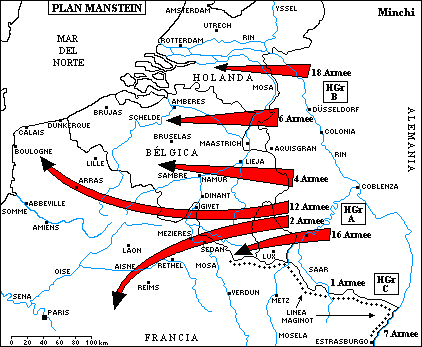
The original Manstein Plan
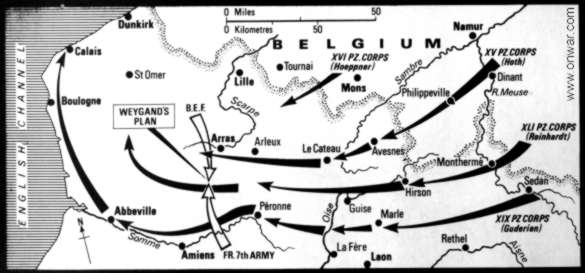
The ACTUAL course of German forces
The order to pause was from the 23-26 and only applied to Army Group A’s armoured formations. The period of the evacuation or Operation Dynamo was 27 May till 3.40 am 4th June. [date-evacuated] (27)8,000 (28)18,000 (29)47,000 (30)60,000 (31)61,000 (1)64,000 (2)40,000 (3)40,000 (4)4,000. The Dutch had surrendered on 14 May and on 28 May the Belgian army capitulated. At the 29th May Cambrai meeting Hitler tells the commanders of his Army Groups that he has decided to ‘deploy the armoured forces immediately for a southward offensive to settle accounts with the French, attacking south on 5thMay. 1st June German artillery bombards the Dunkirk beaches, 2nd June Operation Dynamo completed for the BEF.
The final Dunkirk pocket was established on 31 May and held till 4 June at which point 2,000 guns, 60,000 vehicles, 600,000 tons of fuel and supplies and 76,000 tons of munitions were abandoned. The Germans began their attack south on 5 June so we can see that the Panzers had been reserved for and moved to that task. On May 25, the 1st Panzer division could have thrust forward again and forced the Allied forces in the Dunkirk area to surrender. But Hitler had ordered it to halt the day before. I would put this down to a real concern on Hitler’s part that Guderian’s advance force was vulnerable to a devastating flank attack, combined with a need to assert himself as Fuhrer, in the face of Guderian’s repeated insubordination.
Liddel Heart was mostly responsible for the promotion of this ‘Hitler let them escape’ thinking along with and as a result of Guderian himself AFTER the war but the records of the actual period do not provide the evidence (rather to the contrary).
I think the following spells it out. http://www.ihr.org/jhr/v02/v02p375_Lutton.html
I hope I get to write about Putin in the rear vision mirror but only the good die young so….
 for our time I think it’s useful to look at actual historical events and the differing explanations for why things turned out as they did in the past. As World War 2 is for most people the ‘unavoidable fight’ or ‘the good war’ and is rich with events which are worth reviewing and drawing lessons from, I’ll go there and my example is the
for our time I think it’s useful to look at actual historical events and the differing explanations for why things turned out as they did in the past. As World War 2 is for most people the ‘unavoidable fight’ or ‘the good war’ and is rich with events which are worth reviewing and drawing lessons from, I’ll go there and my example is the 



